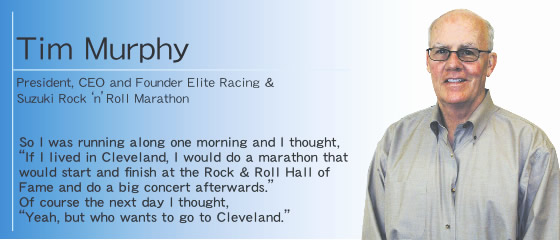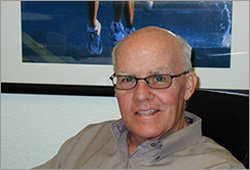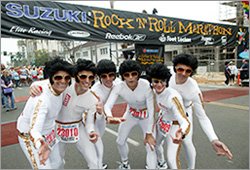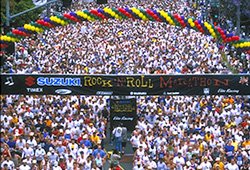YuYu interview Tim Murphy
 |
| —— How did you get interested in running and marathons? Well I had a career in the health care industry, I sold hospital supplies and I moved around a lot. I was sales manager, then a national sales manager, and finally VP of Marketing and I just got tired of the corporate world. They had moved me ten times in eleven years, so I lived just about everywhere Chicago, Portland, Miami, Rochester, and I finally decided I had enough. I had two sisters in San Diego and so I decided to move here. That was in the late seventies, and everybody was running, my sister included, and so I started too. I ran in high school in Nebraska, but never distances. From the beginning I became fanatical about it and I ran about 4-10 miles everyday. I'm very competitive and within a year I had run in two marathons. —— Do you still run much?  Unfortunately no. I've got a disease called neuropathy that affects my feet and so I can't. I'd like to, but I can't. I miss it terribly. Besides work, running was my thing. I've always been a workaholic, usually 10, 12 hours a day. I used to be worse, waking up at 3 am in the morning to start, but not anymore. Unfortunately no. I've got a disease called neuropathy that affects my feet and so I can't. I'd like to, but I can't. I miss it terribly. Besides work, running was my thing. I've always been a workaholic, usually 10, 12 hours a day. I used to be worse, waking up at 3 am in the morning to start, but not anymore.—— It seems that everyone loves the Rock ‘n’ Roll Marathon, what inspired? As I started getting more involved with running, I started reading more about events and I couldn't understand why there were no big time races in San Diego. There were all these great races, but nothing in San Diego. So I started doing a little research, since I'm a marketing and sales guy. Eventually, I got involved with a women named Lynn Flanagan and we were doing finish line services for a quarter a head using Popsicle sticks to mark times. Later Buick came along in 1984 and wanted us to do a race, then some guys called me and wanted to do a race in Carlsbad, which became the Carlsbad 5000. That was the real key. We got to doing more and more races, and we were busy, but we still weren't making any money. I got the idea for the Rock 'n' Roll Marathon when they opened the Rock & Roll Hall of Fame in Cleveland. There was so much hypeムit was everywhere! So I was running along one morning and I thought, "If I lived in Cleveland I would do a marathon that would start and finish at the Rock & Roll Hall of Fame and do a big concert afterwards." Of course the next day I thought, "Yeah, but who wants to go to Cleveland." So I basically put that idea away. Then a year later was the 100th anniversary of the Boston Marathon. There were 273 people from San Diego who ran that race and afterwards they had this get together and all they could talk about was why there wasn't a major a marathon in San Diego. And so these runners some of them pretty important, just wouldn't leave me alone about it. So I essentially dusted off the old idea I had for Cleveland and started. —— It was an ambitious idea, how did you go about getting it started? Well I knew it was going to take a lot of money. I was organizing races, but not marathons, and I thought, "Why couldn't I do it here?" The entertainment capital of the world is only 2 hours away and I had known a big-time film-maker named Frank Marshall, his wife is Catherine Kennedy their last film was "Seabiscuit" and they've done, "Jurassic Park", "Indiana Jones" among others. I got to know Frank because he always came down and ran in the Carlsbad 5000 he was big triathlon fan. I got to know him because one day his sister called and wanted to know if he could ride along in the press car. So that's how I got to know him. So I picked up the phone and called him to make an appointment to discuss this idea. After I did, I put the phone down and thought, "Oh my god, he gets thousands of calls from people who have an idea to do a film and he probably thinks I'm another one." Well, he agreed to meet me and he liked it. I think he was relieved because it wasn't another film idea and he told me to go back and put the paperwork together. So I came back with a prospectus and gave him all the reasons why I thought it would work and he ended up writing me a check for $150,000. All told, I raised total of $500,000 and we were on our way. —— So when you launched the first one back in 1998, how did it go over? Well it was a huge hit from a marketing point of view, but we didn't have the city's support , for example, the police didn't really like doing this and they started the race 37 minutes late. I can't tell you how many things went wrong and how many mistakes I made. To top it all off we lost 1.2 million dollars and we didn't have it. So financially, it was a disaster. The funny thing was that the Leukemia Society made $15 million while we were losing money, but the big key to our success was that we hung in there. It wasn't easy, but we hung on. We put off paying our bills, we talked to our lenders, while at the same time tried to market the next year's event. Our sponsors were good, Suzuki stepped up, and the next year was just great. We put on a fabulous event everything was perfect. —— When you put it all together, did you do it from a runner’s perspective or a spectators? The runners! I think what we've done is really take a look at the total experience. I personally looked at my experience as a marathoner and I ran marathons where there were no spectators, and six water stations that just had water sitting there. I would have killed to have any diversion from the pain and now we've done that with a live band, with a great sound system, so you can here them coming and going, and cheerleaders all over. All of those things boost you and take you away from the pain of running a marathon. We knew we wanted to make a great event for runners that's what we set out to do, but we also came to draw more than 20 times the normal amount of spectators to an event. —— What’s your connection with the Leukemia & Lymphoma Society’s Team in Training?  They are the official charity of all our marathons. That is the big news for this year we were talking this morning that one of the things we're celebrating, starting with our first race in 1998 through the upcoming Rock 'n' Roll Marathon on June 6th, the Leukemia & Lymphoma Society will have reached the $100 million mark in the funds they have raised, in terms of net proceeds, from our musical marathons, and most of those funds have come as a result of the Suzuki Rock 'n' Roll Marathon. That's something that no one will ever take away from us. It's a hard number to get a hold of it's hard to imagine. Let me be clear, we don't raise the money ourselves, but we act as a vehicle through which the Leukemia Society does. We hold spaces in the races, we promote them as the official charity, and when people join they fund raise, then the Leukemia Society trains them, as part of their Team in Training, flies them in, and puts them in a hotel. Sometimes what happens is we'll hold spaces in the race for them, and when we've closed our admissions the only way you can get in is through the Leukemia Society. Over the last few events they've actually brought out some of the children that have been cured through their work and they brought the doctors that found the medicine that cured them and the money for the research can be traced to our events. So it's all come full circle. They are the official charity of all our marathons. That is the big news for this year we were talking this morning that one of the things we're celebrating, starting with our first race in 1998 through the upcoming Rock 'n' Roll Marathon on June 6th, the Leukemia & Lymphoma Society will have reached the $100 million mark in the funds they have raised, in terms of net proceeds, from our musical marathons, and most of those funds have come as a result of the Suzuki Rock 'n' Roll Marathon. That's something that no one will ever take away from us. It's a hard number to get a hold of it's hard to imagine. Let me be clear, we don't raise the money ourselves, but we act as a vehicle through which the Leukemia Society does. We hold spaces in the races, we promote them as the official charity, and when people join they fund raise, then the Leukemia Society trains them, as part of their Team in Training, flies them in, and puts them in a hotel. Sometimes what happens is we'll hold spaces in the race for them, and when we've closed our admissions the only way you can get in is through the Leukemia Society. Over the last few events they've actually brought out some of the children that have been cured through their work and they brought the doctors that found the medicine that cured them and the money for the research can be traced to our events. So it's all come full circle.—— I don’t have to guess how good that makes you feel. Oh it's tremendous. To put things in perspective in 1997 before we started working with them, their total research grants nationally were just about 12 million dollars so in that one-day event we helped them to double their research funding. All in one day. They're doing the work, and we provide them with a compelling event. They are in all of our advertising and entry forms you won't find any of them without their logo and information on it. Then once runners sign up, we ask them to sign up with Team in Training anyway. So we're great partners. So many people need the training and support, plus they get a free ticket to San Diego and a hotel room included in their package. It's an added benefit to what we do, but my god, I never thought I'd have such a positive impact on so many people's lives. —— Is there such a thing as a marathon season? Nowadays the marathon season has become year-round. It used to be just spring and fall, but now for example we've got Arizona in the first week in January, Country Music at the end of April, Suzuki's Rock 'n' Roll in the first week of June, and Virginia Beach on Labor Day. Now these cities are coming to us, they like our demographics, they like what we can bring to a city and the people we bring to spend money in their communities. Hotels, restaurants and the retail groups like to see us coming. It's about economic impact. —— Speaking of impact, what kind of an impact, does the marathon have on San Diego each year? Economically, this event brings in nearly 45 million dollars a year to San Diego in tourism. The average party that comes here is 3.4 people and out of the 20,000 entrants 15,000 of them come from out of town. City Hall loves us now, so do the hotels, restaurants, The Convention and Visitors Bureau, and Chamber of Commerce. Now we've limited ourselves in size to 20,000 and it's sold out every year. It's interesting that we're the only company that puts on major events outside their home base and it's a little surprising. Most of the major marathons are owned by non-profits New York City, Boston, so we've been able to be very successful expanding outside of our market area. It has been very helpful that we're in the television business, we produce about 70% of the running programming you seen on TV, and because of that we can go to a city and tell them we're going to show off whatever they want to show off about their city. we can do it. That way they promote what they want to about their own city. 
Rock and Roll is “King” in San Diego
We've had great bands from the beginning. We've had so many, Hootie and the Blowfish, Chicago, The Goo Goo Dolls, Chris Isaak, and this year we have "Live". We have at least one band every mile, sometimes more, and I think that's difference between what we do and what some of the copycats do we really spend the money on the course. We get real bands, a real stage, and real sound system. We spend over a $140,000 just on the sound systems and stages for our acts. We have over 40 bands. Now we get more than 500 bands a year that apply to play on our course, but it wasn't always like that. The first year it was hard, but what happened was that one of the bands got a record deal because someone saw them here on TV and so now everybody wants to play here. —— What about you Tim, what kind of music do you like? I still like the music I grew up with. The Beatles and bands like that it's still what I really like, but I like all kinds of music, rock, country and even a lot of current music. I may not know the all the bands by name, but there are a lot of songs I know and like. As for the bands that play here we have the whole gamut of music covered; rock, 80s, African, reggae, techno, funk, Spanish- contemporary, hip hop, funk, country, rap. Now we even have a Country Music Marathon, in Nashville. —— Have there been any special moments over the years? Many, some good some bad, but my favorite moment was in our very first year at the Suzuki when looking out of the corner of my eye I saw two legendary basketball players, Wilt Chamberlain and Bill Walton, standing together talking at the race. That stands out seeing those two 7-footers. —— Come June 6th, where will you be for the event? I'll be in the lead vehicle. A lot people think it's a parade, but I'm really there to see if there are any problems. And it's a good thing I'm out there because I've spotted quite a few potential disasters before they happened. —— And when it ends, when do you start working on the 2005 event?  You know the answer to that one the next day. Actually, this time we've already been working on 2005 for a couple of months now, because there are some special issues next year. As soon as it's over we get so many e-mails generally saying, "Thanks for a great race, but you should know that it would really be better if you changed this." Sometimes what runners think is a big deal, we didn't consider, or things we thought were important, no one even noticed. You know the answer to that one the next day. Actually, this time we've already been working on 2005 for a couple of months now, because there are some special issues next year. As soon as it's over we get so many e-mails generally saying, "Thanks for a great race, but you should know that it would really be better if you changed this." Sometimes what runners think is a big deal, we didn't consider, or things we thought were important, no one even noticed.(06-01-2004 issue, Interviewed by Terry Nicholas) |

